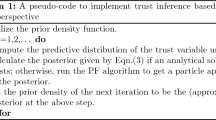Abstract
Trust models have been touted to facilitate cooperation among unknown entities. Existing behavior-based trust models typically include a fixed evaluation scheme to derive the trustworthiness of an entity from knowledge about its behavior in previous interactions. This paper in turn proposes a framework for behavior-based trust models for open environments with the following distinctive characteristic. Based on a relational representation of behavior-specific knowledge, we propose a trust-policy algebra allowing for the specification of a wide range of trust-evaluation schemes. A key observation is that the evaluation of the standing of an entity in the network of peers requires centrality indices, and we propose a first-class operator of our algebra for computation of centrality measures. This paper concludes with some preliminary performance experiments that confirm the viability of our approach.
An erratum to this chapter can be found at http://dx.doi.org/10.1007/11914853_71.
Preview
Unable to display preview. Download preview PDF.
Similar content being viewed by others
References
Abdul-Rahman, A., Hailes, S.: Supporting trust in virtual communities. In: HICSS 2000: Proceedings of the 33rd Hawaii International Conference on System Sciences, vol. 6. IEEE Computer Society Press, Washington (2000)
Aberer, K., Despotovic, Z.: Managing trust in a peer-2-peer information system. In: Paques, H., Liu, L., Grossman, D. (eds.) Proceedings of the Tenth International Conference on Information and Knowledge Management (CIKM 2001), pp. 310–317. ACM Press, New York (2001)
Aberer, K., Fischer, G.: Semantic query optimization for methods in object-oriented database systems. In: ICDE, pp. 70–79 (1995)
Bertino, E., Montesi, D., Trombetta, A.: Fuzzy and presentation algebras for web and multimedia data. ideas 2000, 134 (2000)
Carter, J., Bitting, E., Ghorbani, A.: Reputation formalization within information sharing multiagent architectures (2002)
Ford, D.: Trust and knowledge management: The seeds of success. Technical Report WP 01-08, Queen’s School of Business, Queen’s University at Kingston, Canadas, (November 2001)
Grust, T., Teubner, J.: Relational algebra: Mother tongue—xquery: Fluent. In: Proceedings of the first Twente Data Management Workshop on XML Databases and Information Retrieval, Enschede, The Netherlands (2004)
Herings, P., van der Laan, G., Talman, D.: Measuring the power of nodes in digraphs. Technical report (2001)
Huebsch, R., Chun, B., Hellerstein, J.M., Thau, B., Maniatis, P., Roscoe, T., Shenker, S., Stoica, I., Yumerefendi, A.R.: The architecture of pier: an internet-scale quey processor. In: Proceedings of the 2005 CIDR Conference (2005)
Huynh, T.D., Jennings, N.R., Shadbolt, N.R.: Developing an integrated trust and reputation model for open multi-agent systems. In: AAMAS-04 Workshop on Trust in Agent Societies (2004)
Ismail, R., Josang, A.: The beta reputation system. In: Proceedings of the 15th Bled Conference on Electronic Commerce (2002)
Josang, A.: The right type of trust for distributed systems. In: Proceedings of the 1996 New Security Paradigms Workshop (ACM) (1996)
Kamvar, S.D., Schlosser, M.T., Garcia-Molina, H.: The EigenTrust algorithm for reputation management in P2P networks (2003)
Khare, R., Rifkin, A.: Weaving a web of trust. World Wide Web Journal 2, 77–112 (1997)
Kleinberg, J.M.: Authoritative sources in a hyperlinked environment. Journal of the ACM 46(5), 604–632 (1999)
Lin, N.: Foundations of Social Research. McGraw-Hill, New York (1976)
Marsh, S.: Formalising Trust as a Computational Concept. PhD thesis, Department of Mathematics and Computer Science, University of Stirling, UK (1994)
Page, L., Brin, S., Motwani, R., Winograd, T.: The pagerank citation ranking: Bringing order to the web. Technical report, Stanford University (1998)
Resnick, P., Zeckhauser, R., Friedman, E., Kuwabara, K.: Reputation systems: Facilitating trust in internet interactions. Communications of the ACM, pp. 45–48 (December 2000)
Sabater, J., Sierra, C.: REGRET: reputation in gregarious societies. In: Müller, J.P., Andre, E., Sen, S., Frasson, C. (eds.) Proceedings of the Fifth International Conference on Autonomous Agents, Montreal, Canada. ACM Press, New York (2001)
Seamons, K.E., Winslett, M., Yu, T., Smith, B., Child, E., Jacobson, J., Mills, H., Yu, L.: Requirements for policy languages for trust negotiation. In: POLICY, pp. 68–79 (2002)
Sherwood, R., Lee, S., Bhattacharjee, B.: Cooperative peer groups in nice. Computer Networks 50(4), 523–544 (2006)
Valente, T.W., Foreman, R.K.: Integration and radiality: Measuring the extent of an individual’s connectedness and reachability in a network. Social Networks 20, 89–105 (1998)
Wang, Y., Vassileva, J.: Trust and reputation model in peer-to-peer networks. In: Peer-to-Peer Computing, p. 150–157 (2003)
Yamamoto, A., Asahara, D., Itao, T., Tanaka, S., Suda, T.: Distributed pagerank: A distributed reputation model for open peer-to-peer networks. In: SAINT-W 2004 (SAINT 2004 Workshops). IEEE Computer Society Press, Washington (2004)
Yu, B., Singh, M.P.: A social mechanism of reputation management in electronic communities. In: Klusch, M., Kerschberg, L. (eds.) CIA 2000. LNCS, vol. 1860, pp. 154–165. Springer, Heidelberg (2000)
Author information
Authors and Affiliations
Editor information
Editors and Affiliations
Rights and permissions
Copyright information
© 2006 Springer-Verlag Berlin Heidelberg
About this paper
Cite this paper
von der Weth, C., Böhm, K. (2006). A Unifying Framework for Behavior-Based Trust Models. In: Meersman, R., Tari, Z. (eds) On the Move to Meaningful Internet Systems 2006: CoopIS, DOA, GADA, and ODBASE. OTM 2006. Lecture Notes in Computer Science, vol 4275. Springer, Berlin, Heidelberg. https://doi.org/10.1007/11914853_27
Download citation
DOI: https://doi.org/10.1007/11914853_27
Publisher Name: Springer, Berlin, Heidelberg
Print ISBN: 978-3-540-48287-1
Online ISBN: 978-3-540-48289-5
eBook Packages: Computer ScienceComputer Science (R0)




